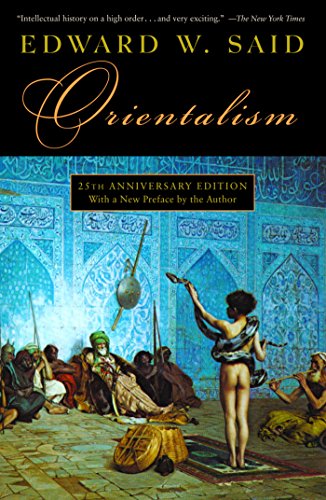Edward Said, Orientalism (1978)
Difficult, tendentious, infuriating, indispensible. What is there to say now about Orientalism, a work that altered its field so profoundly? Orientalism, for all its flaws — and they are many — is a book like On the Origin of Species or The Interpretation of Dreams, a book that created around itself a before and an after. For any Westerner writing about the East, Orientalism is something you have to grapple with (and if you haven’t it shows, Elizabeth Gilbert!).
The first time I read Orientalism, I remember arguing with Said quite a bit as I went along. This time, having read a great deal more of the scholarship he’s talking about, I didn’t argue as much. It was clearer what he was attacking and what he wasn’t, and it read less like an assault on all of Western thought than like a lament for the shift from the earliest Orientalists, the translators and enthusiasts, to the institutionalized purveyors of recycled truisms in service of empire.
A danger, with Orientalism — one for which Said takes some of his critics to task in an afterword — is slipping into that universalist mindset, which is exactly what Said is attacking. A lengthy book insisting that the recurring error of Orientalism is to essentialize should not be read as essentializing all of Western thought or scholarship. Another danger is letting Orientalism live too much inside your head, to where you can no longer speak your own thoughts and experiences because you hear Edward Said whispering in your ear, questioning whether your thoughts are your own or just the received idea, and if the latter, whether you’d be doing harm by recapitulating them. If everyone who travels to India, for example, reports seeing many of the same things, there is the possibility that it’s because those things are actually there, and that they are interestingly different from what you find elsewhere, and that it’s not merely a set of received ideas derived from books.
That said, it’s undeniable that we all came to India expecting or hoping for certain things — carrying certain ideas — and Said is illuminating in describing how these ideas came to be, and how they came to be repeated.

